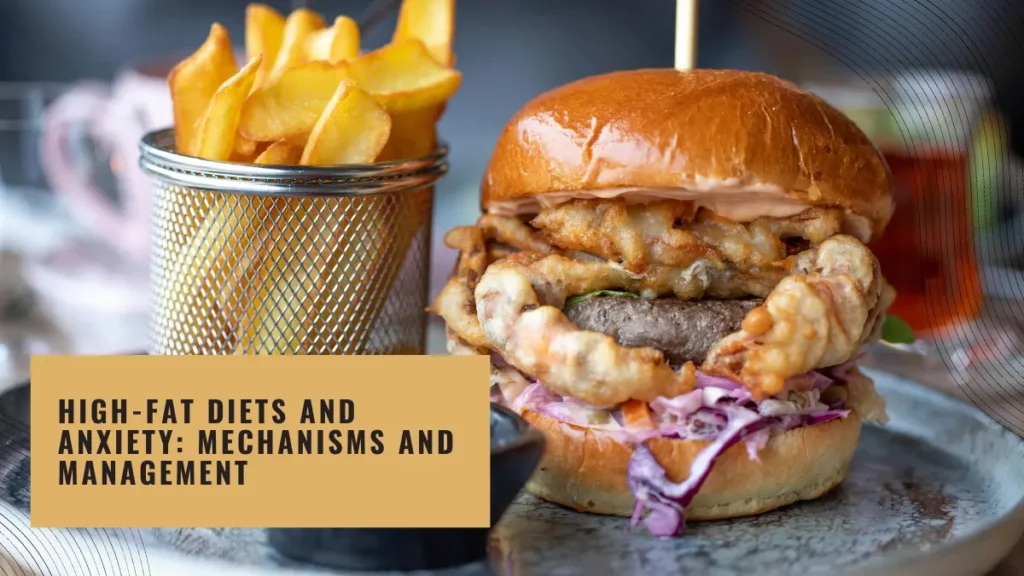High-fat diets are becoming more common in today’s world, often because of the convenience and tastiness of processed and fast foods. However, recent studies have shown a worrying connection between high-fat diets and increased anxiety levels. Research has found that eating a lot of fat can:
- Disrupt the natural bacteria in our guts
- Change how we behave
- Affect the chemicals in our brains
- Ultimately make us more anxious
This discovery is important because it helps us understand how what we eat can affect our mental health.
Eating a healthy diet is important not just for our bodies but also for our minds. The fact that high-fat diets can make us more anxious shows that we need to think about what we eat in a more complete way. We need to understand that what we put into our bodies can have big effects on how we feel.
In this article, we will explore the relationship between high-fat diets and anxiety in more detail. We will look at why these diets might make us more anxious and what we can do about it.

Table of Contents
ToggleHigh-Fat Diets and Anxiety : Understanding the Mechanisms: How High-Fat Diets Affect Anxiety
Gut-Brain Communication
High-fat diets can influence anxiety development through their impact on gut-brain communication. The gut and the brain are intricately connected via the gut-brain axis, allowing for bidirectional communication between the two systems. Disruptions in this communication can lead to alterations in mood and behavior, potentially contributing to anxiety symptoms.
Role of Gut Bacteria
The balance of gut bacteria plays a crucial role in regulating mood and behavior. High-fat diets have been shown to disrupt this balance, leading to changes in the composition of gut microbiota. Such alterations can affect the production of neurotransmitters and neuroactive compounds, influencing emotional well-being and contributing to anxiety-related behaviors.
Impact of Altered Brain Chemicals
Consumption of high-fat diets can lead to alterations in brain chemicals, including neurotransmitters and inflammatory mediators. These changes may directly influence anxiety symptoms by affecting neural circuits involved in emotional regulation and stress response.
Also Read
PTSD and Anxiety: The Silent Struggles of College Life
Neuroinflammatory Processes
There is growing evidence suggesting that neuroinflammatory processes play a significant role in linking dietary factors, such as high fat content, to increased anxiety. Inflammation in the brain can disrupt normal neuronal function and contribute to the development or exacerbation of anxiety-related behaviors.
By understanding these underlying mechanisms, we gain valuable insights into how high-fat diets can affect anxiety and mental well-being. The intricate interplay between diet, gut health, and brain function highlights the importance of holistic approaches to promoting mental wellness.
The Study: Investigating the High-Fat Diet-Anxiety Connection
A research study was conducted to examine the impact of dietary factors on mental health outcomes and understand the link between high-fat diets and anxiety levels. The study aimed to explore the association between high-fat diets and anxiety, taking into account other factors that could affect the results.
Study Design
The study collected data from a large group of participants to assess the relationship between high-fat diets and anxiety levels. This type of study design allowed the researchers to look at various factors that might contribute to anxiety symptoms.
Participants
A diverse group of individuals took part in the study, representing different age groups and backgrounds. They were selected based on specific criteria, including age range, gender distribution, and dietary habits. The researchers used different methods to recruit participants, such as online surveys and community outreach programs.
Findings
The findings of the study showed that there is a positive link between high-fat diets and anxiety levels. Participants who reported eating more high-fat foods displayed higher levels of anxiety symptoms compared to those with lower fat intake. Importantly, the researchers made sure to consider other factors that could influence these results.
These findings suggest that our food choices can have an impact on our mental well-being. It indicates that following a healthy diet low in fat may be helpful in reducing anxiety symptoms. However, it’s important to note that more research is needed to understand if high-fat diets directly cause increased anxiety.
This study provides valuable insights into how our diet can affect our mental health. It highlights the need to consider nutrition as a potential factor in managing anxiety and encourages further investigation into this area.
Influence on Stress Response and Emotional Well-being
A high-fat diet can significantly impact our stress response and emotional well-being. Here’s how changes in gut microbiota composition and the role of the HPA axis contribute to this connection.
1. Impact of High-Fat Diet on Gut Microbiota
When we consume a high-fat diet, it can change the types and amounts of bacteria in our gut. Specifically, research has shown that a high-fat diet is linked to:
- Reduced diversity of bacteria in the gut
- Imbalances in the ratio of Firmicutes to Bacteroidetes
These changes in gut microbiota composition can have a profound impact on our stress response. The gut microbiota plays a crucial role in regulating the communication between our gut and brain, known as the gut-brain axis. It influences various aspects of our mental health, including anxiety levels.
“The balance of bacteria in your gut can affect your mood and anxiety levels.” – Dr. Lisa Mosconi
2. Connection Between Gut Health and Emotional Well-being
The HPA axis is a complex system involved in regulating our body’s response to stress. It consists of three main components: the hypothalamus, pituitary gland, and adrenal glands. When we experience stress or perceive a threat, the HPA axis is activated.
One crucial factor that influences the functioning of the HPA axis is gut health. The communication between the gut microbiota and the brain occurs through various pathways, including the vagus nerve. This bidirectional communication can influence the HPA axis and subsequently impact our emotional well-being.
“Your gut health can affect how your body responds to stress.” – Dr. Rangan Chatterjee
3. Disruption of Gut-Brain Communication by High-Fat Diet
Research has suggested that alterations in gut microbiota composition due to a high-fat diet can disrupt this delicate balance. As a result, it may impair the regulation of stress responses within the body. This dysregulation can lead to an increased vulnerability to anxiety symptoms.
“A high-fat diet can throw off the balance of good and bad bacteria in your gut, affecting your mental health.” – Dr. Uma Naidoo
4. Impact on HPA Axis Functioning
Research has shown that alterations in gut microbiota composition, such as those induced by a high-fat diet, can disrupt the HPA axis function. This disruption may lead to an exaggerated stress response and an increased risk of anxiety disorders.
“Your gut health affects your hormonal balance, including stress hormones like cortisol.” – Dr. Will Bulsiewicz
Understanding the influence of a high-fat diet on stress response and emotional well-being is crucial for developing effective strategies to manage anxiety. By targeting gut health and the HPA axis, we can potentially improve mental health outcomes and alleviate anxiety symptoms.
5. Nutritional Interventions
It’s important to note that dietary interventions can mitigate some of these negative effects. For instance, consuming dietary fiber from plant-based sources has been shown to promote diversity in gut microbiota and
Managing Anxiety Through Diet: The Role of Nutritional Interventions
1. Healthy Eating Habits for a Calm Mind
Promote the consumption of whole, unprocessed foods and provide tips for incorporating them into daily meals. Incorporating whole foods such as fruits, vegetables, lean proteins, and whole grains can have a positive impact on mental well-being. These foods are rich in nutrients and antioxidants that support overall health and may help reduce anxiety symptoms. Encouraging meal planning and preparation can also contribute to a sense of control and mindfulness around food choices.
Mindful eating practices can play a crucial role in reducing anxiety-related symptoms and improving digestion. By paying attention to the sensory experiences associated with eating, individuals can foster a healthier relationship with food and gain a better understanding of their body’s nutritional needs. Mindful eating involves:
- Savoring each bite
- Acknowledging hunger and fullness cues
- Being present in the moment during meals
This approach can help alleviate stress and promote a more balanced emotional state.
By incorporating these strategies into daily life, individuals can proactively manage their anxiety through dietary interventions that prioritize whole, nutritious foods and mindful eating practices.
2. Nutritional Adequacy and Hydration
The key to promoting overall mental wellness and effectively managing anxiety lies in maintaining a balanced and nourishing diet. Here’s how you can ensure that your diet supports your mental health:
a. Include a Variety of Nutrient-Rich Foods
Incorporating a variety of vitamin- and mineral-rich foods into your meals is crucial for providing your body with the essential building blocks it needs for optimal mental health. Some examples of nutrient-dense foods include:
- Fruits and vegetables
- Whole grains
- Lean proteins (such as chicken, fish, tofu, or legumes)
- Healthy fats (like avocados, nuts, and olive oil)
By diversifying your plate and including these foods regularly, you can support brain function and emotional well-being.
b. Stay Hydrated Throughout the Day
Dehydration can worsen anxiety symptoms by increasing physiological stress on the body. That’s why it’s important to prioritize proper hydration. Here are some practical habits you can adopt:
- Carry a reusable water bottle with you wherever you go
- Set reminders on your phone or use an app to prompt you to drink water regularly
- Consume hydrating foods like fruits (watermelon, oranges) and vegetables (cucumbers, celery)
By making these habits a part of your daily routine, you can ensure that you’re getting enough water to keep your body hydrated and support a calmer mind.
Remember: Prevention is better than cure. Staying hydrated throughout the day is easier than trying to catch up on fluids when you’re already dehydrated.
c. Mindful Eating Practices and Strategic Meal Planning
In addition to focusing on specific nutrients and staying hydrated, it’s also important to cultivate mindful eating practices and engage in strategic meal planning. Here’s how:
- Mindful eating: Pay attention to your body’s hunger and fullness cues, eat slowly, and savor each bite. This can help prevent emotional eating and promote a healthier relationship with food.
- Strategic meal planning: Plan your meals ahead of time, incorporate a balance of macronutrients (carbohydrates, proteins, and fats), and include foods that you enjoy. Having a structured approach to meals can reduce decision fatigue and ensure that you’re nourishing your body consistently.
By integrating these nutrition tips into your daily routine, you can take proactive steps towards enhancing your emotional well-being through mindful eating practices and strategic meal planning.
3. The Role of Specific Nutrients in Anxiety Modulation
Adopting a balanced and nourishing diet is essential for overall mental wellness, including strategies for managing anxiety. Research has shown that certain nutrients can play a significant role in anxiety modulation. Incorporating these nutrients into your diet can potentially alleviate anxiety symptoms and promote a healthy mindset. Here are two key nutrients that have been linked to anxiety relief:
- Omega-3 Fatty Acids: Omega-3 fatty acids, found primarily in fatty fish like salmon, sardines, and mackerel, have been studied extensively for their potential benefits in reducing anxiety. These essential fats are known to support brain health and can help regulate neurotransmitter function, including serotonin, which plays a crucial role in mood regulation. Research suggests that higher intake of omega-3 fatty acids is associated with reduced anxiety levels (1). Incorporating omega-3-rich foods into your diet or considering fish oil supplements may be beneficial for individuals with anxiety disorders.
- Probiotic Foods: The gut-brain axis is a bidirectional communication system between the gut and the brain, and emerging research suggests that gut health plays a vital role in mental well-being. Probiotics are beneficial bacteria that can help maintain a healthy gut microbiome. Several studies have indicated that probiotic supplementation or consuming probiotic-rich foods such as yogurt, kefir, sauerkraut, and kimchi may positively impact anxiety symptoms (2). These “good” bacteria can help reduce inflammation in the body and produce compounds that influence brain function.
Incorporating these specific nutrients into your diet can contribute to overall mental wellness and potentially alleviate symptoms of anxiety. However, it’s important to note that nutrition should be viewed as part of a holistic approach to anxiety management. Consulting with a healthcare professional or registered dietitian can provide personalized recommendations tailored to your specific needs.
Please note that while certain nutrients may have potential benefits for anxiety relief, it’s essential to consult with a healthcare professional or registered dietitian before making significant changes to your diet or incorporating supplements.
The Connection Between Breathing Exercises And Mental Health
Conclusion
The connection between high-fat diets and anxiety is becoming more and more clear. This study has provided insights into how high-fat diets can make anxiety symptoms worse, such as by disrupting communication between the gut and the brain and triggering neuroinflammation.
Understanding how dietary factors affect mental health is crucial, and we need to explore the long-term effects of high-fat diets on anxiety. Additionally, it’s important to conduct clinical trials that specifically look at dietary interventions for people with existing anxiety disorders.
By doing these trials, we can:
- Determine whether certain nutritional approaches are effective in managing anxiety symptoms
- Improve overall mental well-being through dietary changes
This will help us provide better support and guidance to individuals with anxiety disorders, empowering them to make healthier choices for their mental health.
FAQs (Frequently Asked Questions)
What is the significance of high-fat diets in today’s society?
High-fat diets are prevalent in today’s society and have been linked to various health issues, including mental health concerns such as anxiety.
How do high-fat diets influence anxiety development?
High-fat diets may influence anxiety development through mechanisms such as gut-brain communication, alterations in brain chemicals, and neuroinflammatory processes.
Can you provide an overview of the research study exploring the relationship between high-fat diet and anxiety levels?
The study investigated the methodology used and characteristics of the participants, with key findings supporting a positive association between high-fat diets and anxiety, while controlling for confounding variables.
How do high-fat diet-induced changes in gut microbiota composition impact stress response and emotional well-being?
Changes in gut microbiota composition due to high-fat diets can impact stress response and emotional well-being by affecting bacterial diversity, Firmicutes/Bacteroidetes ratio, and the HPA axis (hypothalamic-pituitary-adrenal axis).




